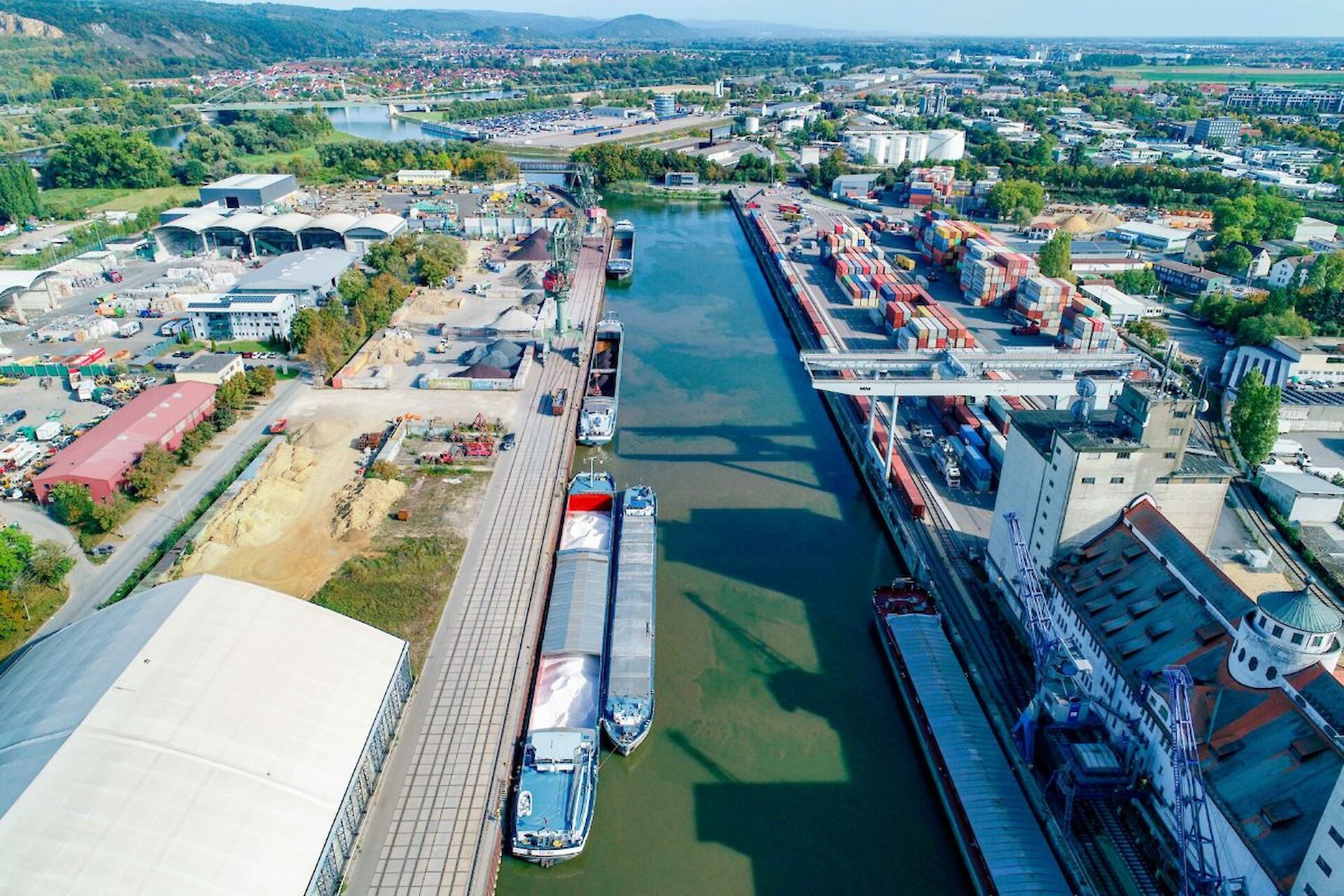

27 Feb 2024 13:00 Hinterland
In the past year, bayernhafen moved 8.23 million tonnes of cargo and freight by inland waterway and rail at its six locations of Aschaffenburg, Bamberg, Nuremberg, Roth, Regensburg and Passau. This amounted to 92% of the total tonnage moved in 2022. As developments within the ports typically echo trends observed in the broader business landscape and the economy at large, the freight handling figures are also a reflection of the current situation. Around 476,000 road trips were saved by shifting long-distance traffic to the more environmentally friendly transport modes of rail and inland waterway.
In 2023, the volume of goods transported by rail reached 6.025 million tonnes, marking an 8.1% increase compared to the preceding year. 2.21 million tonnes of goods were moved by inland waterway transport, a decrease of 8.8% on 2022. Combined transport throughput across all bayernhafen locations totalled 452,599 TEU (1 TEU = one twenty-foot container), depicting an 11.6% reduction from the previous year. In addition to containers for seaport-hinterland traffic, combined transport includes swap bodies and semi-trailers for continental cargo and freight transport.
Playing a crucial role as logistics hubs, bayernhafen locations, along with the 400-plus companies operating from their ports, guarantee a dependable supply of essential products to both industry and the general public. The transportation of goods, including agricultural produce, construction materials, metals, foodstuffs, recycling materials, minerals, and industrial products like machinery, automotive parts, and heavy-lift components such as transformers, is efficiently facilitated through inland waterway and rail networks.
The repercussions of the war in Ukraine, the shift towards clean and renewable energy sources, and the substantial economic downturn are unmistakably mirrored in the port’s freight handling statistics. “A port serves as a seismographic indicator of developments in the economy,” says the Chief Executive Officer of bayernhafen, Joachim Zimmermann. “However, as the focus sharpens on environmental protection and the shift to sustainable transport, the port’s role as a central hub gains increasing significance. Inland ports are poised to play a pivotal role in facilitating a successful transition to clean energy sources, fostering a more robust circular economy, and promoting sustainability in heavy-lift transport. The essential prerequisite for this evolution remains a high-performance infrastructure, ensuring the seamless integration of inland waterway, rail, and road transport within the logistics chain.”
In 2023, bayernhafen sustained its commitment to substantial investment, allocating approximately €27 million to the redevelopment of its commercial sites and port infrastructure. “Through long-term investment in our trimodal port infrastructure, we are making a valuable contribution to the future of sustainable transport. Notably, the companies operating from bayernhafen’s ports are leveraging this phase, augmenting their investments in existing corporate locations and establishing new service links. Nevertheless, it remains evident that a pivotal factor in achieving the envisioned modal shift in the future lies in addressing the substantial need for infrastructure modernisation in Germany, encompassing the rail network, locks, and bridges. We need stable conditions, significantly accelerated approval processes and robust protection for the port infrastructure to facilitate this transformative progression,” says Joachim Zimmermann.
Outlook for 2024
In April 2024, bayernhafen is set to launch a new daily rail service from its Regensburg location to Lébény in Hungary. This innovative service will employ the horizontal loading technology developed and patented by Helrom GmbH, allowing the efficient loading of semi-trailers onto trains without the requirement for cranes or reach stackers. In pursuit of this modal shift, bayernhafen is directing investments towards the modification of its Trailerport, a dedicated terminal designed for the handling of swap bodies and semi-trailers.
Following the lease agreement for a site at Quay 1 in bayernhafen Nürnberg, the recycling company, Durmin, is actively investing in a diverse array of facilities geared towards the processing of both mineral and non-mineral waste and products.
The bayernhafen Regensburg-based logistics services provider, Horst Pöppel Spedition, is building a new multi-user logistics facility. The facility, which has been ‘Gold’ certified by the German Sustainable Building Council (DGNB), is scheduled to be completed in the 3rd quarter of 2024.
bayernhafen and the companies operating from its ports extend a warm invitation to all citizens of Regensburg to a grand port festival scheduled to take place on 15 September 2024. The festival aims to offer visitors an engaging and insightful experience into the diverse and thrilling world of logistics.
The cumulative freight transferred by rail and inland waterway at bayernhafen in 2023 amounted to 8.23 million tonnes.